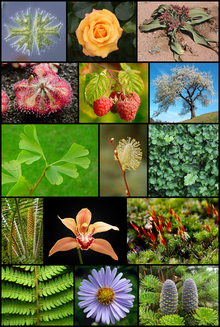What does plants mean?
Definitions for plants
plants
This dictionary definitions page includes all the possible meanings, example usage and translations of the word plants.
Did you actually mean plantago or plant tissue?
Wikipedia
plants
Plants are predominantly photosynthetic eukaryotes of the kingdom Plantae. Historically, the plant kingdom encompassed all living things that were not animals, and included algae and fungi; however, all current definitions of Plantae exclude the fungi and some algae, as well as the prokaryotes (the archaea and bacteria). By one definition, plants form the clade Viridiplantae (Latin name for "green plants") which is sister of the Glaucophyta, and consists of the green algae and Embryophyta (land plants). The latter includes the flowering plants, conifers and other gymnosperms, ferns and their allies, hornworts, liverworts, and mosses. Most plants are multicellular organisms. Green plants obtain most of their energy from sunlight via photosynthesis by primary chloroplasts that are derived from endosymbiosis with cyanobacteria. Their chloroplasts contain chlorophylls a and b, which gives them their green color. Some plants are parasitic or mycotrophic and have lost the ability to produce normal amounts of chlorophyll or to photosynthesize, but still have flowers, fruits, and seeds. Plants are characterized by sexual reproduction and alternation of generations, although asexual reproduction is also common. There are about 320,000 known species of plants, of which the great majority, some 260,000–290,000, produce seeds. Green plants provide a substantial proportion of the world's molecular oxygen, and are the basis of most of Earth's ecosystems. Plants that produce grain, fruit, and vegetables also form basic human foods and have been domesticated for millennia. Plants have many cultural and other uses, as ornaments, building materials, writing material and, in great variety, they have been the source of medicines and psychoactive drugs. The scientific study of plants is known as botany, a branch of biology.
U.S. National Library of Medicine
Plants
Multicellular, eukaryotic life forms of the kingdom Plantae. They are characterized by a mainly photosynthetic mode of nutrition; essentially unlimited growth at localized regions of cell divisions (MERISTEMS); cellulose within cells providing rigidity; the absence of organs of locomotion; absence of nervous and sensory systems; and an alteration of haploid and diploid generations.
Editors Contribution
plantsnoun
Plural noun and verb form of the word plant.
My mother has a number of plants.
Submitted by MaryC on December 9, 2015
Surnames Frequency by Census Records
PLANTS
According to the U.S. Census Bureau, Plants is ranked #29581 in terms of the most common surnames in America.
The Plants surname appeared 797 times in the 2010 census and if you were to sample 100,000 people in the United States, approximately 0 would have the surname Plants.
95.8% or 764 total occurrences were White.
2.3% or 19 total occurrences were of two or more races.
0.6% or 5 total occurrences were of Hispanic origin.
British National Corpus
Spoken Corpus Frequency
Rank popularity for the word 'plants' in Spoken Corpus Frequency: #1411
Written Corpus Frequency
Rank popularity for the word 'plants' in Written Corpus Frequency: #2724
Numerology
Chaldean Numerology
The numerical value of plants in Chaldean Numerology is: 6
Pythagorean Numerology
The numerical value of plants in Pythagorean Numerology is: 1
Examples of plants in a Sentence
Sierra Club executive director:
The days of coal-fired power plants putting Americans at risk are coming to an end, in Iowa and across the country, people are demanding clean air and clean water and they are winning.
The new coal-fired power plants that the country has been adding, they represent a major carbon bomb for the planet.
Self-medication — where individuals use plant parts or non-nutritional substances to combat pathogens or parasites — has been observed across multiple animal species including insects, reptiles, birds and mammals, current Biology.Bears two closest living relatives, chimpanzees and bonobos, for instance, swallow leaves of plants with anthelmintic( antiparasitic) properties and chew bitter leaves that have chemical properties to kill intestinal parasites.
Proterocladus antiquus is a close relative of the ancestor of all green plants alive today.
They confirm that the scale of the illegal wildlife trade, including trade in plants, is much greater than we had previously thought.
Popularity rank by frequency of use
Translations for plants
From our Multilingual Translation Dictionary
- النباتاتArabic
- PflanzenGerman
- plantasSpanish
- plantesFrench
- nHungarian
- TanamanIndonesian
- 植物Japanese
- planterNorwegian
- plantasPortuguese
- растенияRussian
- växterSwedish
- thực vậtVietnamese
- 植物Chinese
Get even more translations for plants »
Translation
Find a translation for the plants definition in other languages:
Select another language:
- - Select -
- 简体中文 (Chinese - Simplified)
- 繁體中文 (Chinese - Traditional)
- Español (Spanish)
- Esperanto (Esperanto)
- 日本語 (Japanese)
- Português (Portuguese)
- Deutsch (German)
- العربية (Arabic)
- Français (French)
- Русский (Russian)
- ಕನ್ನಡ (Kannada)
- 한국어 (Korean)
- עברית (Hebrew)
- Gaeilge (Irish)
- Українська (Ukrainian)
- اردو (Urdu)
- Magyar (Hungarian)
- मानक हिन्दी (Hindi)
- Indonesia (Indonesian)
- Italiano (Italian)
- தமிழ் (Tamil)
- Türkçe (Turkish)
- తెలుగు (Telugu)
- ภาษาไทย (Thai)
- Tiếng Việt (Vietnamese)
- Čeština (Czech)
- Polski (Polish)
- Bahasa Indonesia (Indonesian)
- Românește (Romanian)
- Nederlands (Dutch)
- Ελληνικά (Greek)
- Latinum (Latin)
- Svenska (Swedish)
- Dansk (Danish)
- Suomi (Finnish)
- فارسی (Persian)
- ייִדיש (Yiddish)
- հայերեն (Armenian)
- Norsk (Norwegian)
- English (English)
Word of the Day
Would you like us to send you a FREE new word definition delivered to your inbox daily?
Citation
Use the citation below to add this definition to your bibliography:
Style:MLAChicagoAPA
"plants." Definitions.net. STANDS4 LLC, 2024. Web. 27 Jul 2024. <https://www.definitions.net/definition/plants>.



Discuss these plants definitions with the community:
Report Comment
We're doing our best to make sure our content is useful, accurate and safe.
If by any chance you spot an inappropriate comment while navigating through our website please use this form to let us know, and we'll take care of it shortly.
Attachment
You need to be logged in to favorite.
Log In